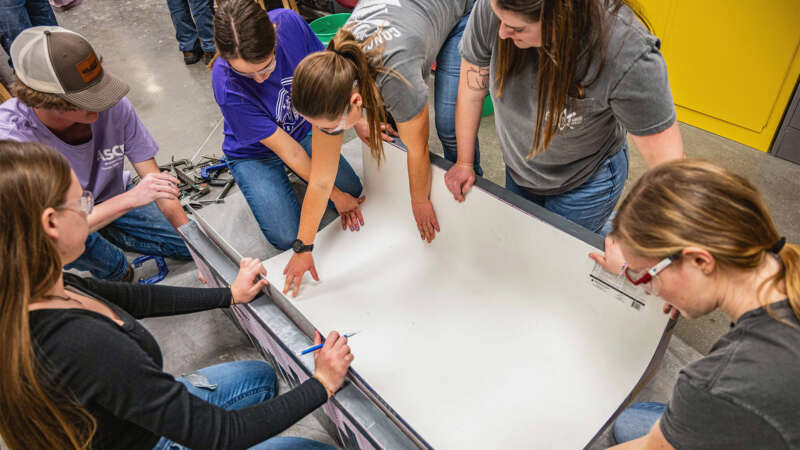What Wildcat wouldn’t sign up for a class where the headbanging homework stretches from “Purple Haze” through “Purple Rain”?
Almost 14,000 K-Staters have taken History of Rock and Roll since 2007, and it was one of the top five most-attended courses this spring.
We asked Susan Maxwell, professor of bassoon, what makes her class rock.
Is this class more music than history — or more history than music?
It’s certainly more music than history, but it’s all intertwined. Because you can’t talk about Marvin Gaye’s “What’s Going On” without including the civil rights movement and the Vietnam War. The class moves decade by decade so I show images and talk about events that are relevant to the time.
When did rock and roll officially begin?
We refer to what we call the first wave of rock and rollers in the 1950s: Fats Domino, Little Richard, Buddy Holly. That’s our first crew.
Our next wave, like Elvis, really take things to a new level.
Did rock and roll ever changed the course of history?
I think the best example is James Brown at the Boston Garden right after Rev. Martin Luther King, Jr., had been assassinated. His large-venue performance was actually moved by city officials — and televised — because they felt his show would be good for the city at the time.
At some point in the performance, the level of frustration about the injustices going on reached a fever pitch. The crowd started to rush the stage.
Then James Brown essentially gives the audience a scolding and brings everybody back to square. He says this is an opportunity to experience a peaceful moment. And he’s also saying “We cannot riot,” because he knew that there was rioting in other communities.
James Brown has got lots of titles. He’s “godfather of funk,” he’s “father of soul.” He’s the inventor of everything delicious! He’s one of the great front men, one of the great innovators. He’s got all these names already, but also to have the title of “peacemaker.” That’s really powerful.
Which artists do today’s students discover in your class?
We always have the Beatles and Sam Cooke. Some students say James Brown. Marvin Gaye usually ends up near the top of the list. A lot of times they’ll say Elvis, because they didn’t know who he was but their parents and their grandparents have talked about him. And we’ve had the Elvis movies.
I try to always connect to films — like the Bob Marley and Amy Winehouse biopics, or Timothy Chalamet in the Bob Dylan movie — so students will connect with those artists, too.
They don’t know Elvis. What is the world coming to?
I have to always remind myself that this generation was born after 2000! For anything prior to that, they need some kind of intentional exposure to it.
One thing that’s really cool is that they can watch these artists on YouTube and in documentaries. When you take a classical musical class, you don’t get to see a Mozart video!
What counts as rock? Is electronic dance music “rock”? Is country?
That’s a great question. I start the class in the 1950s talking about how we created these separate charts. Rock and roll is a merging of country and western, rhythm and blues, and popular music. Those three charts merged to form rock and roll, so the umbrella of “rock” is very large.
It’s kind of like talking about “classical music” and “music from the classical era.” In the classical world, we use those interchangeably, but they can also have different meanings.
What’s homework like in this class?
The assignment that seems to be the most impactful is this: I ask them to listen to an album in a genre outside of what they normally listen to. I talk about how, if you like country music, you’ll enjoy other styles. Maybe you like the steady beat or are drawn to the storytelling, so let’s find another genre with some similar qualities.
After listening to one student describe his interests, I said, “Why don’t you try U2 or Mumford and Sons?” And of course, he had never heard of them!
This is an opportunity to expand their palate. Their feedback always is “I really am glad that I was forced to do this” because they wouldn’t do it if it wasn’t for an assignment.
But now they’re listening to something different, and maybe discovering a song or two they like. They often will say, “I’ve added this to my Spotify playlist.” And that’s gratifying for me.
What do students find the most challenging?
Their ultimate assignment is attending a live music performance that’s under the umbrella of a genre that we’ve talked about in class. You could go see some crazy stuff at the Bottleneck in Lawrence. You could go to Auntie Mae’s for a local band. You could go to a coffee shop where somebody’s singing and playing guitar.
For this post-COVID crew, we’ve got to get them out there so they don’t just sit at home and watch more online. I want them to go to a show!
Which artists from today will be on the class syllabus 20 years from now
Well, I’ve got two teenage daughters. They don’t love Taylor Swift, but they listen to her.
But she’s been really significant. If you look at the thread of history, she is a name that will continue — and Beyonce, too. They’re both incredibly popular. Take Taylor’s Eras tour — we haven’t seen that level of ticket sales.
Our genres today are so fragmented, and we don’t all listen to the same radio enough to have one shared mega-star. But Taylor really has reached an audience that is mega-star big, and she will continue to be a part of the course as an artist who isn’t going to be a victim of the industry.
But think about 20 years from now: that generation will be even less familiar with the artists we cover in class now. They’ll be another generation removed from the one whose grandparents loved Elvis, so we’ll have to cover those earlier artists even more.
Some bands like the MC5 are in the Rock and Roll Hall of Fame, but most people can’t name any of their songs. Same is true for some hip-hop pioneers, who created the genre but never had giant record sales. Will they eventually be forgotten
There are groups — or albums — that didn’t get enough light, but were influential. One of the most common examples is the “Pet Sounds” album by the Beach Boys. That ended up being so influential, particularly to the Beatles, who then influenced everybody. It’s fun to make those connections.
True “Pet Sounds” fans want the mono version, not stereo. How can old technologies remain cool?
There are things that we can’t anticipate in terms of audio. Is the next generation going to be doing all of their videos in virtual reality? It’s hard to even say.
My husband and I have our record album collection, and we’ve enjoyed watching this new generation get into LPs. Part of what we love is that experience of putting a record on — there’s an intentionality to it. And it’s not so sterile: You’re able to hear the guitar shifts. You can hear the singer take a breath.
There was a student who asked me if I knew what Lo-Fi is. There’s actually a market for kids who want less polished music they can connect to. I thought that was super cool.
Do you have a class band like in that “School of Rock” movie?
We don’t, because it’s a large lecture class. And there’s so much information to pack in that I’m already guilty of selective neglect!
But my husband and I have three children, and throughout the course of their lives, I have forced them to do some family band playing. And it was met with total resistance! We play and sing together sometimes, but my kids are involved in classical music: my oldest plays bassoon, my middle plays oboe and our youngest plays euphonium.
Of course, K-State has many other classes where students can learn instruments and music theory. There’s even a music education course that puts them into small rock groups!
You’re also K-State’s bassoon studio director. On a scale of one to 11, how hard does that bassoon ensemble rock?
I think my History of Rock and Roll teaching has rubbed off! I had a student interested in arranging so we created “California Dreaming” for bassoon ensemble. And on our website, there’s our version of Toto’s “Africa.”
Then this semester, we performed “Spring” by Vivaldi. We play everything!
Watch the bassoon ensemble’s Godzilla medley arranged by a student





